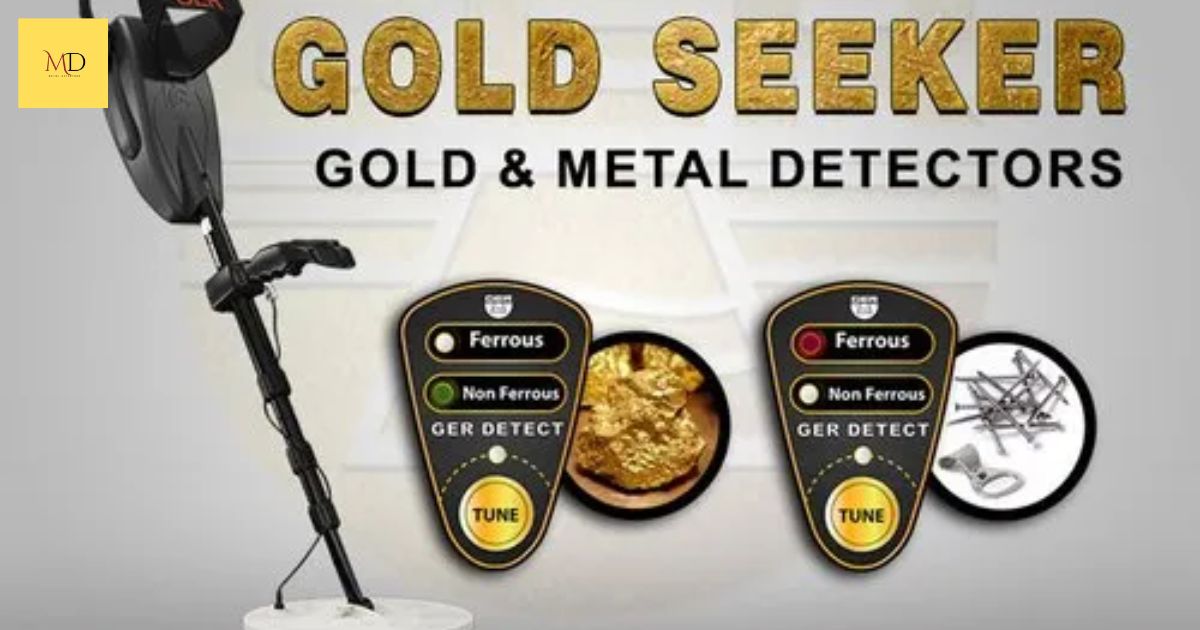A metal detector is an electronic device that detects the presence of metal objects in the surrounding area. It works by emitting an electromagnetic field and then measuring the disturbance in that field when metal is nearby. Metal detectors are commonly used for security screening, treasure hunting, and archaeological exploration.
Unearth hidden treasures with the power of technology! Ever wondered, “Can metal detectors find gold?” Discover the answer to this golden question and embark on your own treasure-hunting journey. Find out how metal detectors can lead you to precious gold nuggets and be ready to strike it rich.
Metal detectors can indeed find gold. They work by detecting metal objects, including gold nuggets, based on their conductivity and magnetic properties. Gold is an excellent conductor of electricity, which makes it detectable by most metal detectors. However, the success of finding gold depends on the detector’s sensitivity.
How Metal Detectors Work
Metal detectors operate on a simple yet effective principle. They emit an electromagnetic field or signal into the surrounding environment. When this signal encounters a metal object, it induces a disturbance in the field. This disruption triggers the detector to produce an alert, usually in the form of an audible sound or a visual display on the device. The key to their functionality lies in the electrical conductivity and magnetic properties of the metal being detected.
The type of metal detector determines the specific technology it uses, whether it’s Very Low-Frequency (VLF), Pulse Induction (PI), or Beat-Frequency Oscillation (BFO). Each technology has its strengths and limitations. VLF detectors are excellent at discriminating between different types of metals, making them popular for general-purpose use. PI detectors, on the other hand, are known for their depth and reliability in highly mineralized soil.
Principles of Detection
The principles governing metal detectors’ ability to locate various metals, including gold, are based on electromagnetic fields and conductivity. When a metal detector is activated, it emits an electromagnetic field into the surrounding area. As this field encounters any metal object, it induces an electrical current within the metal. The induced electrical current generates a secondary magnetic field that interferes with the detector’s initial electromagnetic field. This disturbance is what the metal detector detects and signals to the user, indicating the presence of metal.
Conductivity plays a vital role in this process. Gold is an excellent conductor of electricity, which makes it highly responsive to metal detectors. Its conductivity allows the electromagnetic field to penetrate the gold object, resulting in a noticeable signal. However, the success of finding gold also depends on factors like the detector’s sensitivity, the size and shape of the gold piece, and the mineralization of the soil. Understanding these principles is essential for those who seek to use metal detectors for prospecting and treasure hunting.
Conductivity of Gold
Gold is known for its exceptional electrical conductivity. It is one of the most conductive metals, allowing electricity to flow through it with minimal resistance. This property makes gold highly desirable for various electronic applications. In the world of electronics, gold is frequently used in connectors, switches, and other components because it ensures efficient transmission of electrical signals. The conductivity of gold also extends to its use in precision instruments and even in space exploration, where it is employed in sensitive equipment due to its reliability in extreme conditions.
Gold’s excellent thermal conductivity is another valuable trait. It helps dissipate heat efficiently, making gold crucial in the manufacturing of high-end electronics and heat-sensitive applications. The dual conductive properties of gold, both electrical and thermal, make it a prized material across industries and a fascinating element for scientific exploration.
Types of Metal Detectors

Types of metal detectors vary in design and purpose, each tailored for specific applications. One common distinction is between Very Low-Frequency (VLF) detectors, Pulse Induction (PI) detectors, and Beat-Frequency Oscillation (BFO) detectors. VLF detectors are versatile and suitable for most treasure hunting and relic hunting tasks. They operate by emitting a low-frequency electromagnetic field that reacts to metallic objects’ conductivity, offering excellent discrimination capabilities to identify different metals.
PI detectors, on the other hand, are excellent for finding deep or heavily buried objects. They use quick pulses of electricity to create magnetic fields, which are disrupted by metallic objects. PI detectors are less sensitive to mineralization in the soil, making them suitable for beach and underwater searches. However, they may lack discrimination features, making it harder to distinguish between types of metals.
Beat-Frequency Oscillation (BFO) Detectors
Beat-Frequency Oscillation (BFO) detectors are a type of metal detector known for their simplicity and effectiveness in finding various metal objects, including gold. These detectors operate by generating two oscillating frequencies – one fixed and the other variable. When the frequencies intersect, they create a “beat” frequency, hence the name. When the detector comes in contact with a metal object, it disrupts the beat frequency, producing an audible signal..
One of the advantages of BFO detectors is their ability to handle mineralized soils, which can pose challenges for other types of detectors. They are less affected by ground mineralization, making them a practical choice in areas with high mineral content. Additionally, they are typically less expensive than some other detectors, making them accessible to a wider range of enthusiasts.
PI (Pulse Induction) Detectors
Pulse Induction (PI) detectors are a popular and effective type of metal detector, widely used in various applications. These detectors operate by emitting short pulses of electromagnetic energy into the ground and then measuring the time it takes for the reflected pulse to return. PI detectors are highly sensitive to all types of metals, including non-ferrous metals like gold and silver, making them ideal for treasure hunters, gold prospectors, and relic seekers.
One of the key advantages of PI detectors is their ability to penetrate mineralized soil, saltwater, and even highly magnetic materials, which can be challenging for other types of metal detectors. This makes them suitable for beachcombing, underwater metal detecting, and searching in areas with significant ground mineralization. However, PI detectors may not provide as much discrimination between different types of metals, so users may need to dig more to identify targets accurately.
FAQ’s
How do metal detectors detect gold?
Metal detectors detect gold based on the metal’s electrical conductivity and magnetic properties.
What metals Cannot be detected by a metal detector?
Most metal detectors are unable to detect non-metallic materials, such as plastics, wood, or ceramics.
How far can metal detectors detect gold?
The detection range of metal detectors for gold can vary widely based on factors like the size of the gold, the type of metal detector, and the mineralization of the soil.
Conclusion
Metal detectors are versatile tools capable of unearthing hidden treasures, including the precious allure of gold. These devices operate on the principles of conductivity and electromagnetic fields, making them reliable in detecting various metals, with gold being no exception. While the depth of gold detection can vary based on factors like nugget size and detector type, the possibility of finding gold is a thrilling prospect for many enthusiasts.
Whether you’re a novice treasure hunter or an experienced prospector, the world of metal detecting offers endless adventures. From the serene beaches to rugged terrains, and even beneath the waters, metal detectors have become indispensable for those seeking valuable artifacts and precious metals. The success stories of those who’ve struck gold with metal detectors serve as a testament to the excitement and potential that this hobby offers.











